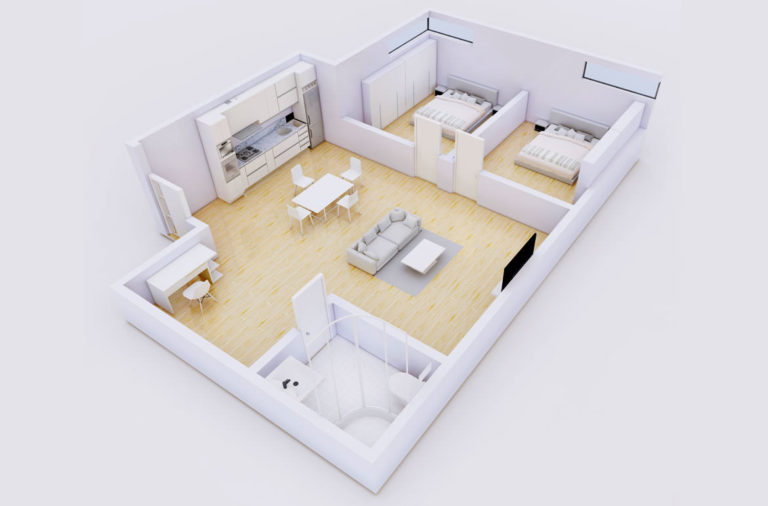
If you’re limited for space on your property, you may be thinking about building a smaller granny flat. So, how big is a 1-bedroom granny flat?
The standard size for a 1-bedroom granny flat starts at about 40sqm, and ranges up to approximately 55sqm.
Today I will discuss all the design ideas and elements of a 1-bedroom granny flat, including how to:
DON'T PAY A FORTUNE FOR YOUR GRANNY FLAT. Find out how to deal with council and build a granny flat for the lowest cost possible. Learn More.
- Future proof your granny flat.
- Incorporate a study nook.
- Add design elements for privacy.
As well as a lot more below. It was a pleasure to work with BT + Najam Designers who came up with these designs for this page below.
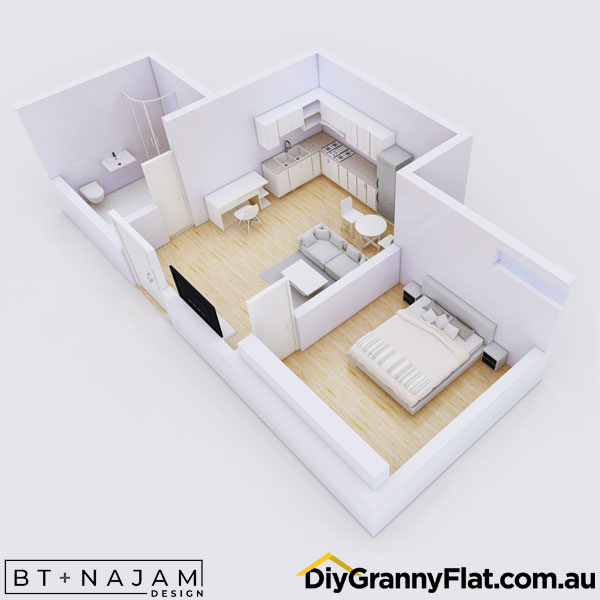
Easily enough space for two people in this design
So, with a lot to cover, let’s begin right away.
If you are looking for general granny flat design ideas click here.
1-Bedroom Design Ideas
The majority of 1-bedroom granny flat floor plans will include:
- An open-plan kitchen, living, and dining area.
- A bedroom with its’ own en-suite and built-in wardrobe.
- A study nook, and
- Multiple storage spaces.
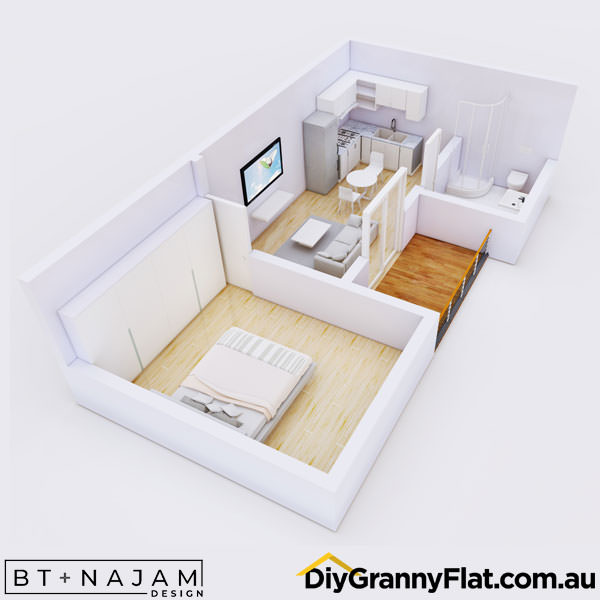
This deck makes the granny flat feel bigger. (Deck space won’t deduct from your allowable floorspace)
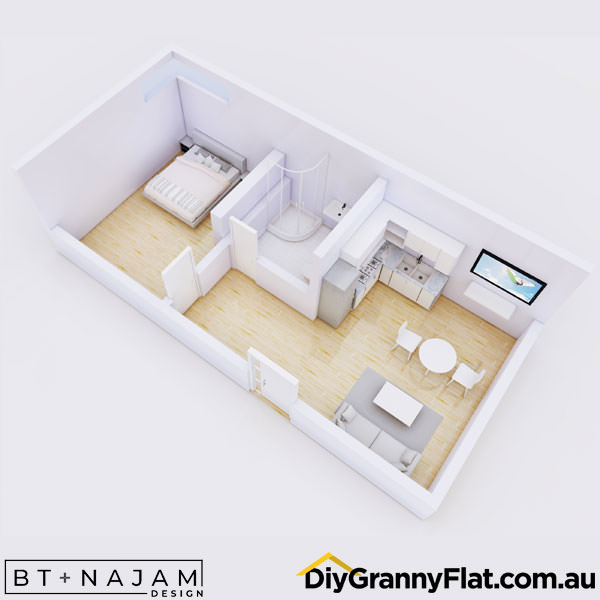
Sometimes a simple design will suit your brief. Easier to build and generally cheaper to construct
An ideal design for a 1-bedroom granny flat is to start with a porch out the front (if you have the room).
Then, have a glass sliding door opening directly from the porch to the open plan kitchen, living, and dining area at the front. This will let in an abundance of natural light.
At the back, place your bedroom, with its’ en-suite (bathroom), and built-in robe.
See Granny Flat Solutions for a great example – they won an award for this excellent design.
You can also think about speaking to a designer, particularly an architect. They will assist you in designing your plans, creating you an architecturally designed granny flat. They will ensure that you:
- Make the best use of your land, and
- Don’t feel restricted by your smaller floor space, by using the finest designs to access natural light, open plan spaces, and multi-purpose rooms.
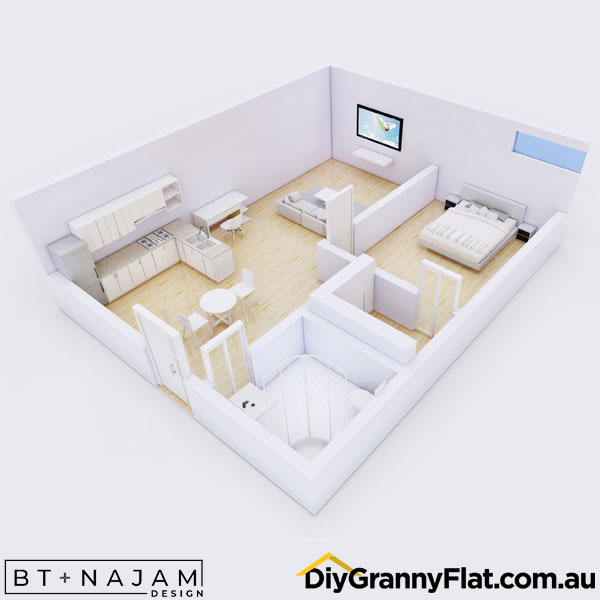
This one bedroom design makes open plan living a breeze
More design ideas are available in this “must read”.
Design Elements
There are 3 important elements to consider during design:
- Mobility.
- Materials, and
- Maintenance.
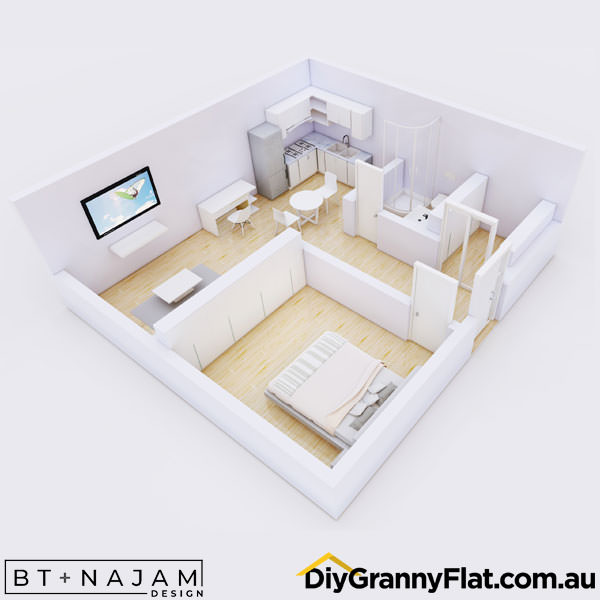
This large bedroom means another desk can be added in the room (For those working from home)
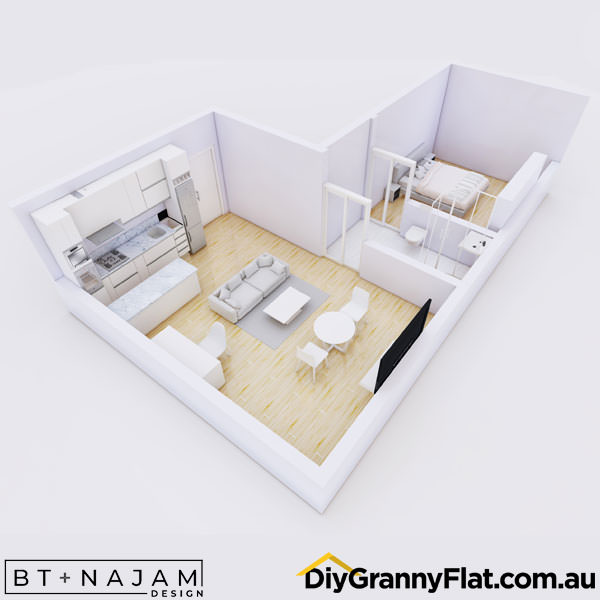
Sometimes you have to work with an unusual land layout. But you can create a floorplan to suit.
Take time choosing your materials, as they provide:
- Aesthetic appeal.
- Insulation, and
- Protection from the weather.
Some materials to consider are:
- Brick veneer – You can read its’ pros and cons here.
- Wood – Many choose wood, as it’s versatile, energy-efficient, easy to maintain, durable, and resilient.
- Metal – You can read the advantages and disadvantages of metal, such as Colorbond.
- Concrete – Concrete walls make a particularly energy efficient granny flat, especially with lots of natural light, as the concrete soaks up the heat from the sunshine.
- Stone veneer – A stone veneer (i.e., limestone or granite), is fairly inexpensive, easy to install, durable, and needs little maintenance.
- Glass – Glass lets in much needed natural light. A strong glass must be used, so it holds out against strong winds and storms.
After choosing your material, you must also choose your:
- Roof type.
- Windows, and
- Doors.
It may help to plan your design with a professional, such as an architect.
They will help you mix up the materials around your dwelling, making best use of your land, creating a stunning architecturally designed granny flat.
Want to know all the materials you should avoid when building your granny flat? Read this.
Future Proofing Your Granny Flat
Something else to think about when designing your granny flat are things that will matter as time progresses – such as the ease of the layout and access for a wheelchair.
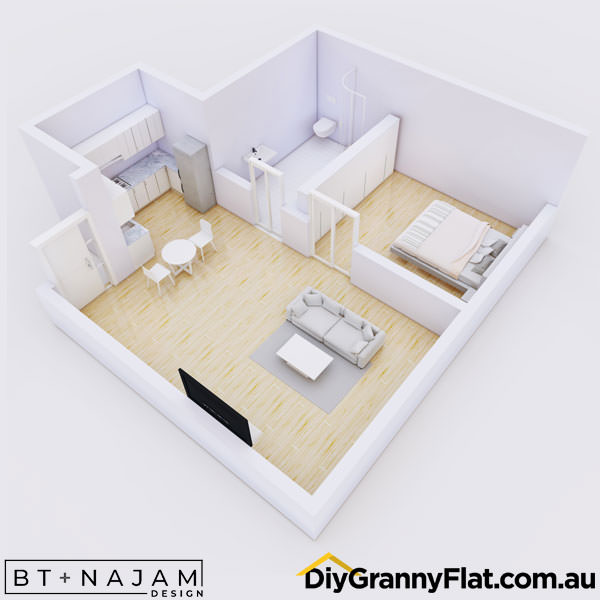
This large open living space, works well for those with mobility issues.
My tips for this are listed below.
Entry
The entryway is a vital part of the design. It must be wide enough, with a big enough door. This makes it easier to move furniture in and out, as well as being more ergonomically designed for people using wheelchairs.
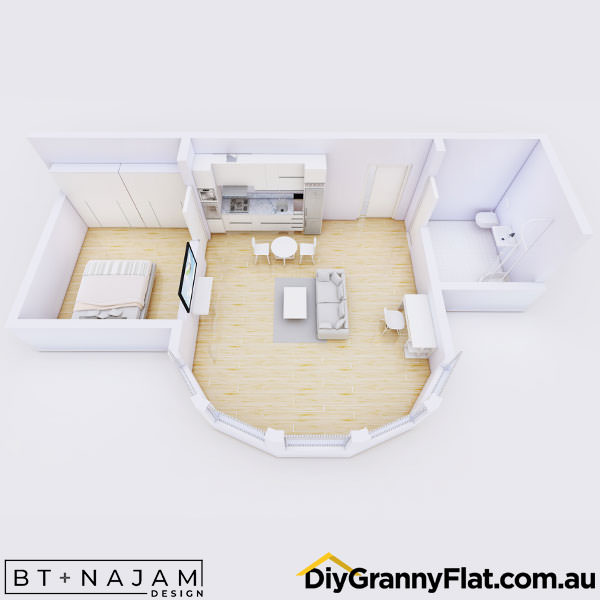
This large space with bay windows would suit wheelchair access
Extra tips for your entrance include:
- Don’t put a lip at the entryway (that is, a raised piece along the edge). As people become older, and suffer from injuries, this can make it hard for them to lift their feet over a traditional doorway.
- Fit a motion sensor light at the entryway, to keep it lit-up at night when needed. This means no fumbling around for light switches at night-time.
- Fit a lever, rather than a round doorknob. Sometimes, people find it difficult to grasp onto something round.
Living Areas / Kitchen
Age, serious illness, and disability can all impact people’s mobility. If your design is open plan, it will make it easier for them to fit in furniture and move between areas.
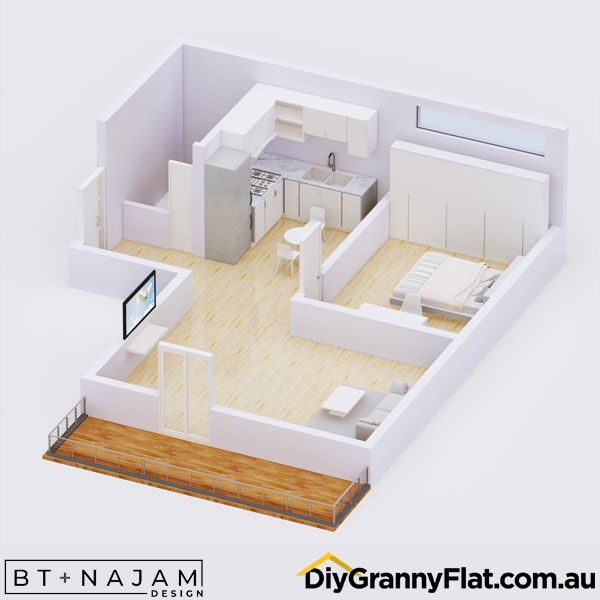
This granny flat with a level deck could easily be accessed with a low rise ramp
The kitchen in particular is one of the most-used and well-loved parts of a home. It must be easy to access – an open plan design will assist with this.
You could also think about installing a breakfast bar or island bench.
These take up little space, and have multiple uses – room for storage, and a place to eat your meals, as can be seen in the picture below.
Floors
Falls are a big problem for people aged 65 and above – and almost 2 out of 3 of these occur around the home.
This can be a result of:
- Slippery flooring, i.e. polished floors, or
- Trip risks, i.e. rugs, or mats.
The safest thing you can do is choose non-slip flooring such as carpet. This is gentle, warm, and soundproof. Your other choices are:
- Cork.
- Linoleoum.
- Vinyl.
- Bamboo.
- Laminate.
- Textured tiling, or
- Hardwood floorboards.
Bathroom
Your objective here is to again prevent any harmful incidents, such as slips and falls.
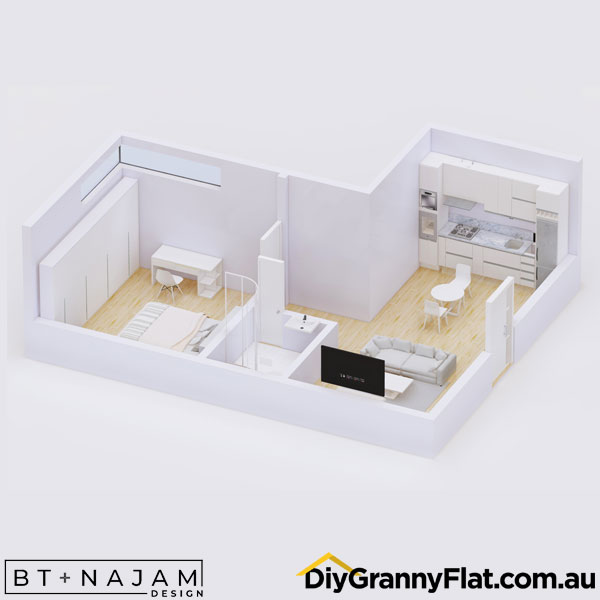
Ensure that you do have enough bathroom access for your tenants or elderly residents
Think about your flooring – non-textured tiles such as ceramic or porcelain are a good choice. Or, you can apply a non-slip tile coating over the top of your tiled floors.
Also install:
- Handrails near the toilet and shower, which will assist with moving around the room.
- A frameless shower screen, which makes the shower open and easily accessible. Make it uncurbed, which means the area must be flat to prevent trips.
- An adjustable showerhead, to make showering less complex.
Lastly, consider installing a hand spray piece that can aid when toileting, and a shower chair for sitting for whilst showering.
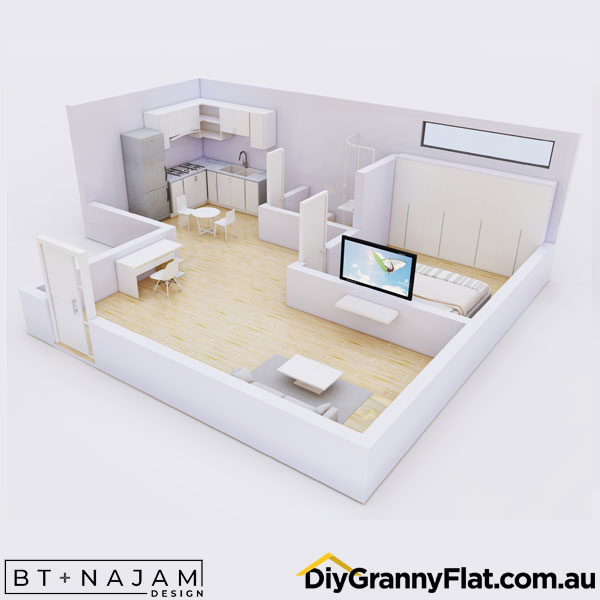
This simple design means you can access everything you need with ease
Bunnings has a great range of independent living aids for use in the bathroom, that you can view here.
Bedroom
Remember, the bedroom is your place of rest and relaxation. It must be a design the tenant will always feel comfortable in.
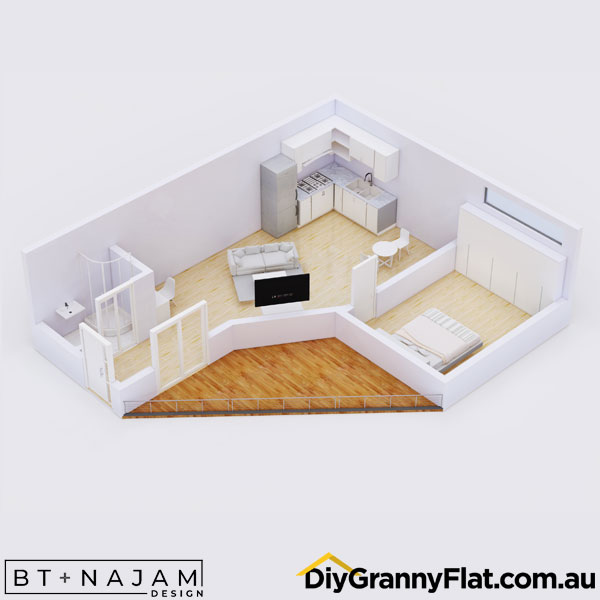
Lots of room around a bed can be designed well within a 60sqm restriction
Ensure the doorways into the bedroom are also wide enough for a person in a wheelchair.
Storage
Storage is particularly important in a small granny flat. It also needs to be easily accessible.
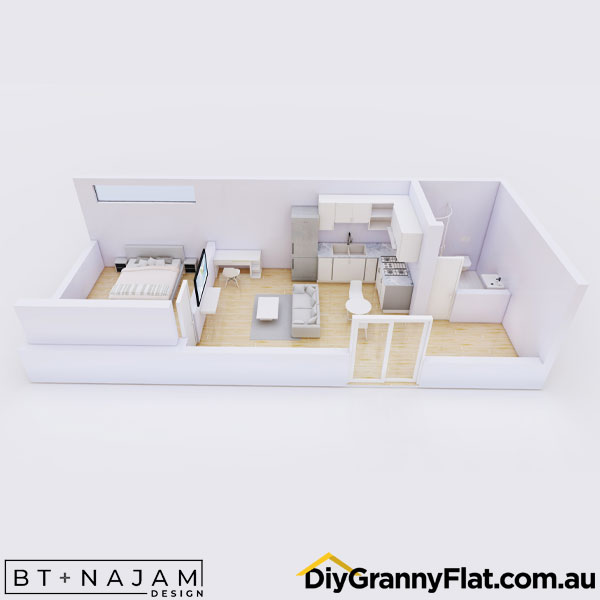
This narrower design can still make room for extra storage on the right if needed
Use your ceiling height and wall space and place cupboards and shelves the entire way up.
When installing drawers, keep in mind that pull-out drawers are better for the elderly, as it makes it easier for them to reach to the back. Also think about your handles – use ones that are easy to pull.
How to Incorporate a “Study Nook”
A “study nook” is a great option instead of an office, especially in a 1-bedroom granny flat. To incorporate one into your design, utilise these tips:
- Take time to think about how you’ll be using the space – Time will help you choose a suitable spot. For example, ensure its large enough you can sit in comfort with a desk, your computer and printer, and reach nearby power-points.
Consider using a room for multiple purposes. For example, you use your living area to entertain guests, but you can also incorporate a study nook here, making it a multi-use room.
Granny flat layouts has more information on ideal multi-use spaces.
It can also help to ask for assistance from an architect.
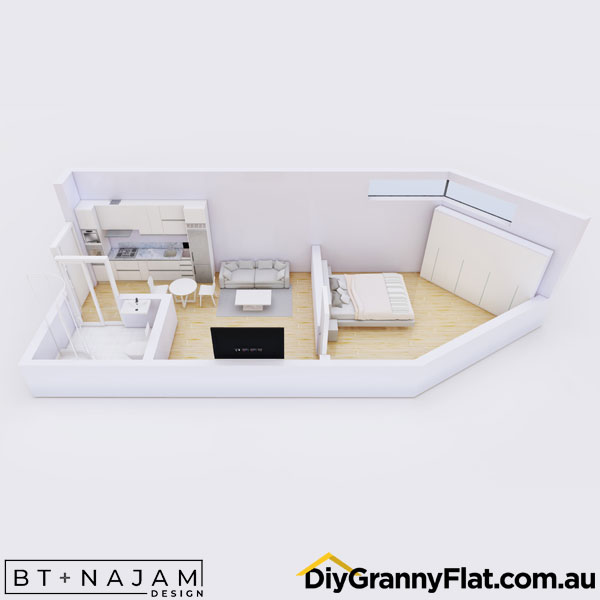
Even with an unusual design, you can make room for storage
- Include storage – Make sure everything has a ‘place’, and you’ll keep the nook neat. Include baskets, drawers, and think ‘outside-of-the-box’ – i.e., floating shelves.
- Add lighting – This will make the nook easier to work in.
Adding Design Elements for Privacy
The rules for granny flats and privacy can be seen here.
To future-proof this, consider your landscaping.
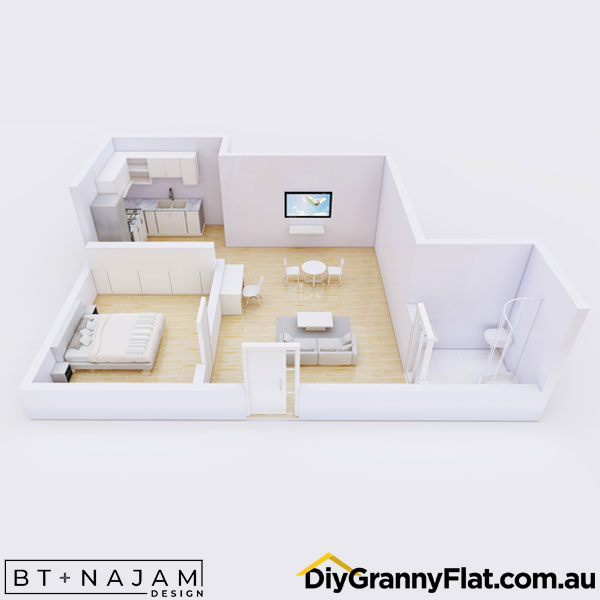
A Kitchen nook might be preferred
The backyard should be a lovely, but safe and low-maintenance area.
Think about installing pavers, so the yard is level and non-slip. Surround the space with native plants that are easy to upkeep.
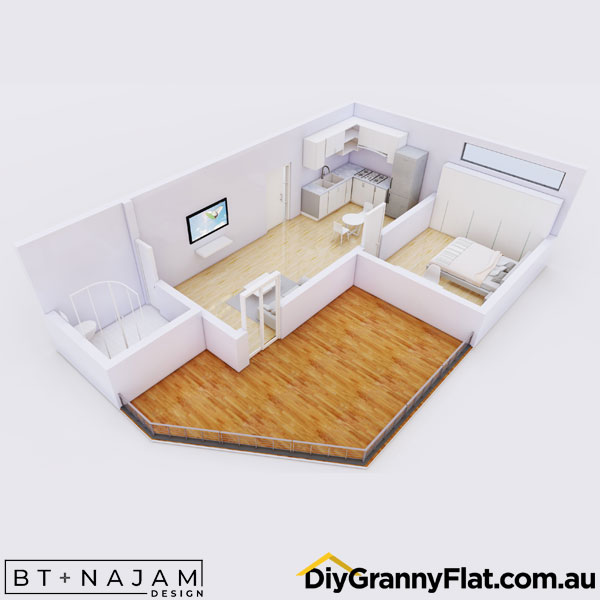
A huge deck (if you have the room) won’t be a problem. You don’t need council permission
If you have the space, a patio outside is always a wise idea. This can be used an area where a person can sit and relax momentarily, perhaps placing their shopping bags down and catching their breath, before taking a few more steps and entering the granny flat.
Conclusion
1-bedroom granny flats are becoming more popular, as they are ideal for those who do not have the land space to fit a larger granny flat.
They are also low-maintenance, so you can “future-proof” them, living a relaxed lifestyle with all the benefits of a full house, all within 40 – 55sqm.




